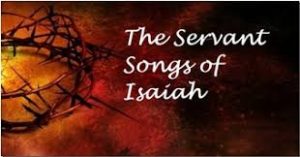The Servant of God the Father
42: 1-17

These verses are the first of Isaiah’s four Servant Songs (49:1-6, 50:4-9, 53:13 to 53:12) referring to the first coming of the Messiah. As believers, we call such passages messianic prophecies. Isra’el is called the servant of the LORD (41:8, 42:19, 43:10, 44:1-2, 22, 45:4, 48:20), and the Messiah, on whom God has placed His Spirit (42:1, 11:2) is also called the Servant (49:3-7, 50:10, 52:13, 53:11). Whether Isaiah is referring to Isra’el or the Messiah must be determined by the context and the characteristics assigned to the servant/Servant. Isra’el, as God’s servant, was supposed to help bring the world to a knowledge of God, but she failed. Thus, the Messiah, the LORD’s Servant, who epitomizes the nation of Isra’el, will fulfill His will.
And as it is important to understand who the Servant of God is, it is just as important to understand who the servant of God is not! Paul warned us: For such men are false prophets, deceitful workmen, masquerading as apostles of Christ. And no wonder, for Satan himself masquerades as an angel of light. It is not surprising then, if his servants masquerade as servants of righteousness. Their end will be what their actions deserve (Second Corinthians 11:13-15). Today the Muslims teach that Muhammad, not Jesus, is the fulfillment of 42:1-17. Muhammad Nubee wrote this information in a pamphlet entitled Christian and Muslim Dialogue. And I have taken the quotes below from pages 41-42. It teaches Muslims how to convert Christians and messianic believers to put their faith in Muhammad and Allah as the one true religion. Taken from Christian and Muslim Dialogue, this is what Muslims believe:
A clearer fulfillment of the prophecy of Muhammad [Praise Be Unto Him] is found in Isaiah 42:
1. Here is my servant, whom I uphold, my chosen one in whom I delight; I will put my spirit upon him and he will bring justice to the Gentiles. (Also called my messenger in verse 19. No doubt all Prophets were indeed servants, messengers and elect of Allah). Yet no Prophet is universally called by these specific titles as Muhammad [PBUH] in Arabic Abduhu wa Rasuluhul Mustapha, or His slave servant and His elected messenger. The testimony of a person accepting Islam is, “I bear witness that Muhammad is His servant and messenger.” This same formula is repeated five times daily, immediately before the beginning of each prayer, nine times a day in the Tashahhud during the minimum obligatory prayers, and several more times if a Muslim performs additional recommended prayers. The most common title of Prophet Muhammad [PBUH] is Rasoolullah, or the messenger of Allah.
2. He will not shout or cry out or raise his voice in the streets. This describes the decency of Prophet Muhammad [PBUH].
3. . . . in faithfulness he will bring forth justice.
4. He will not falter or be discouraged till he establishes justice on earth. In his law the islands will put their hope. This is to be compared with Jesus, who did not prevail over His enemies and was disappointed because of the rejection by the Israelites.
5. I, the Lord, have called you in righteousness; I will take hold of your hand. I will keep you and will make you to be a covenant for the people and a light for the Gentiles. The Muslims teach that the phrase I will keep you means that no other Prophet will come after him. In a short time, many Gentiles were guided to Islam.
6. To open eyes that are blind, to free captives from prison and to release from the dungeon those who sit in darkness. Blind eyes, a life of darkness denotes here the pagan life. Freeing captives from prison denotes the abolishment of slavery for the first time in the history of mankind.
7. I am the LORD, that is my name! I will not give my glory to another or my praise to idols. Prophet Muhammad [PBUH] is unique among all Prophets as he is the Seal of all Prophets and his teachings remain undistorted until today, compared with Christianity and Judaism.
8. Sing to the LORD a new song, his praise from the ends of the earth: The Muslims teach that the phrase a new song is not in Hebrew or Aramaic, but Arabic. The praise of God and His messenger Muhammad [PBUH] is chanted five times daily from the minarets of millions of mosques all over the world.
9. Let the desert and its towns raise their voices; let the settlements where Kedar lives rejoice. Let the people of Sela sing for joy; let them shout from the mountaintops. From Mount Arafat near Mecca the Pilgrims chant every year the following: “Here I come [for Your service] O, Allah. Here I come. Here I come. Verily Yours is the praise, the blessings and sovereignty. There is no partner besides You.” Isaiah 42 can never be applied to an Israelite Prophet as Kedar is the second of Ishmael (Genesis 25:13).
10. Let them give glory to the LORD and proclaim his praise in the islands. And really Islam spread to the small islands as far as Indonesia and the Caribbean Sea.
11. He will triumph over his enemies. In a short period the Kingdom of God on earth was established with the advent of Muhammad [PBUH]. This 42nd chapter of Isaiah fits exactly to the character of Prophet Mohammad [PBUH].
To these lies, believers say in one voice: The god of this age has blinded the minds of unbelievers, so that they cannot see the light of the gospel of the glory of Christ, who is the image of God (2 Corinthians 4:4).



Leave A Comment